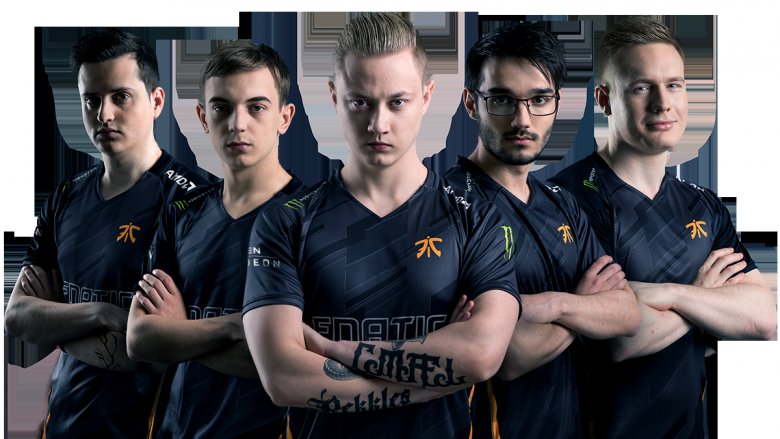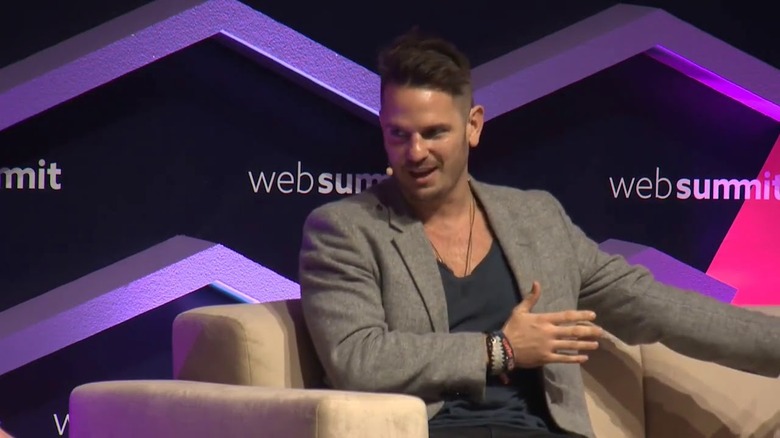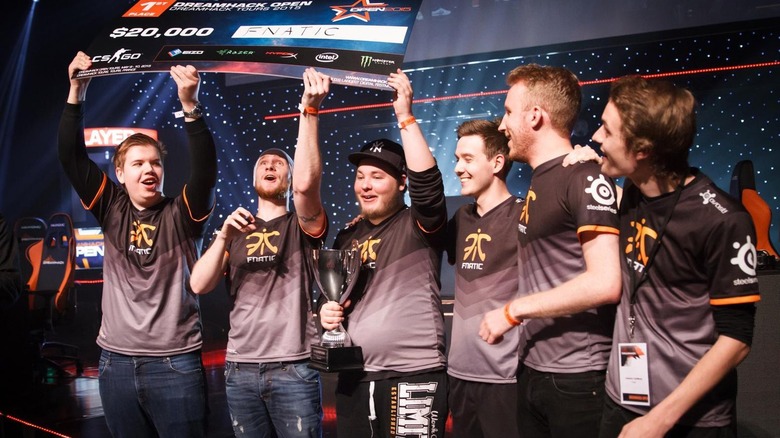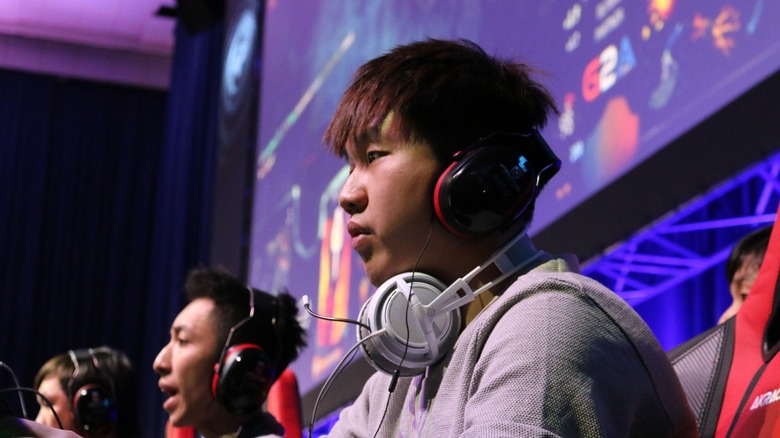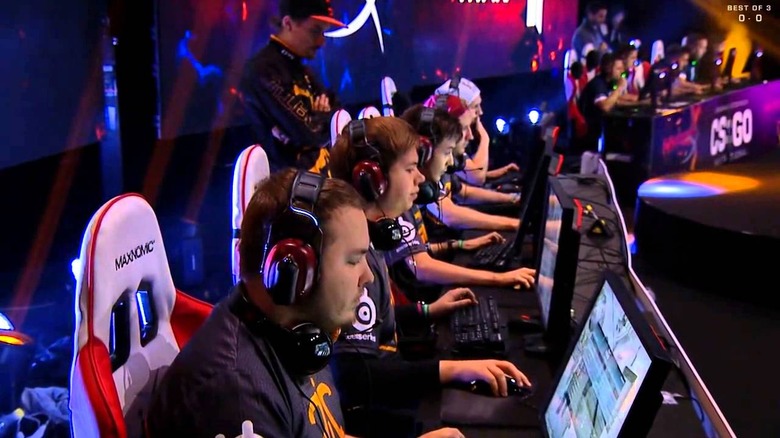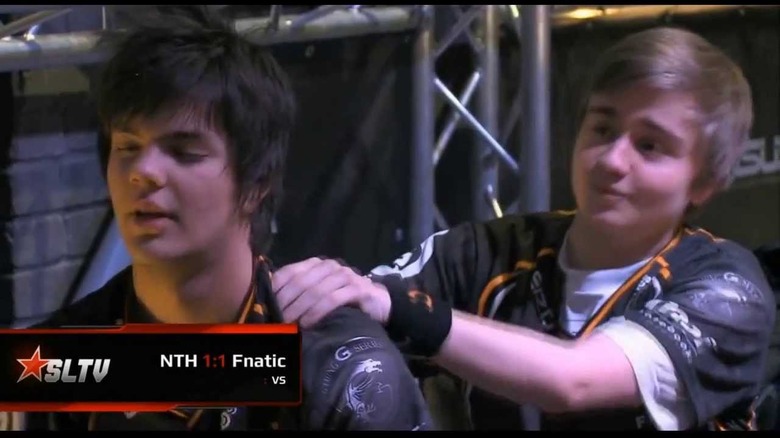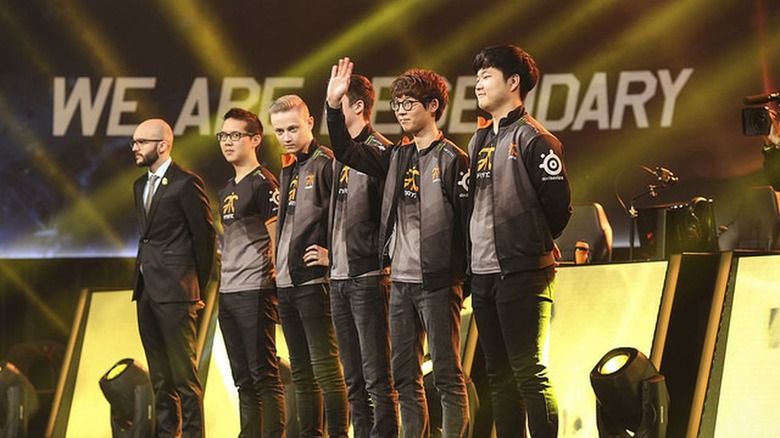The Untold Truth Of Fnatic
When you think tissues, you think Kleenex. When you think copiers, you think Xerox. And when you think esports team, you think Fnatic. The team is that ingrained into the collective consciousness of those who follow professional games. They're huge, and for good reason.
Fnatic, like modern professional gaming, isn't all that old. If you were born on the day Fnatic was founded, you'd only be 14 years old. But the accomplishments that the team has managed to string together in that short time is nothing short of impressive. Competitive teams across a number of different games. International titles for a few of them. A brand that is becoming the Nike "Swoosh" of esports — instantly recognizable. And a few controversies and untold tales along the way.
Below, we cover all of that, with an emphasis on the things you might not know about this monster esports franchise. If you call yourself a Fnatic fanatic, you'll know even more about them by the time you're through. And if you're just learning about this team for the first time — perhaps it'll give you an idea as to how large esports have become. And how Fnatic has played a role in its growth.
Here is the untold truth of Fnatic.
Team founder Sam Mathews sold his car to send the team to its first tournament in 2004
How much would you sacrifice to kickstart your dream — especially you have it at a time it doesn't seem realistic? It wouldn't be honest to say that professional gaming wasn't a thing when Sam Mathews started Fnatic back in 2004. But it certainly wasn't as large as it is today. Seeing esports clips on TV, for instance, would have been unthinkable. And imagining an entire industry that supports teams across a wide variety of games would have seemed far-fetched.
But Sam Mathews believed. He saw a future in esports, and he wanted to be a part of it. So when he founded Fnatic, he sold his car so he'd have the money to send the team to its first tournament.
It was a gamble, but it paid off. Fnatic is now a widely recognized brand in professional gaming, and according to CNN, esports has the potential to be a billion dollar industry by 2019. Fnatic is at the forefront of this growing market, and it's all thanks to a risky decision made by someone who was passionate about pro gaming.
Fnatic is considered one of the best CS:GO teams of all time
Fnatic, as an organization, takes part in a lot of games. It has rosters that play professionally in Dota 2, Call of Duty, Fortnite, League of Legends, and Overwatch. Fnatic plays so many games, in fact, that it's tough to call yourself a fan of the group unless you also specify which game you follow.
But no game has brought Team Fnatic as much success as Counter-Strike: Global Offensive. In fact, Fnatic is considered one of the best CS:GO teams of all time.
What makes Fnatic so special in the CS:GO world? According to PC Gamer, the team has captured "10 offline titles, made 13 finals and reached the top four in 17 out of 18 tournaments." That is pretty darn impressive, especially when you consider that new professional players are constantly coming up through the ranks and being signed by other teams. It's a testament not only to the way the team finds and signs its players, but how well the team gelled and was coached, particularly between 2013 and 2016.
PC Gamer compared the team in its prime to Jordan's Bulls and Gretzky's Oilers. And that's pretty good company to keep.
Controversy surrounded the team's parting of ways with Ohaiyo, a DOTA player
On professional sports teams, players come and go. That's just a part of the business. And it's no different in esports, where players regularly sign onto rosters of pro teams and later leave to pursue opportunities. Many players have come and gone from Fnatic in its existence. But few departures were quite as controversial as that of Ohaiyo, a highly accomplished Dota 2 player.
The reason provided by Fnatic for the release of Ohaiyo was simple: the team simply felt it could bring a player in who gave them a better chance at winning a title. In a statement, the team thanked Ohaiyo for his many years with the team, and said it was helping him "seek other options" in terms of joining a new team. And at first, the split seemed amicable. Ohaiyo put out a statement wishing his former team luck.
But a few days later, Ohaiyo put out a much different message. On Facebook, Ohaiyo informed his fans that his replacement, UNiVeRsE, had actually arrived the day before Ohaiyo's last game, which meant regardless of the outcome, the team had been planning on letting him go. Ohaiyo felt the team wasn't being open and honest with him, and his fans agreed. They spammed Fnatic's social pages with angry posts, and some vowed to stop supporting the team altogether.
The team was accused of cheating in the 2014 DreamHack CS:GO tournament
Cheating in any kind of competition is taken very seriously. It's why you see football players being suspended for taking uncleared substances, or professional cyclists having their titles stripped entirely when they're caught doping. These antics disrupt the level playing field people expect, and they cheapen the experience for everyone.
Video games are no different. Sure, there are "cheat codes" and the like, but in professional play, gamers are expected to adhere to the rules and avoid using unfair advantages. So when a professional esports team gets caught up in a cheating scandal, it's a big deal. And Fnatic has found itself accused of cheating in the past.
At the 2014 DreamHack tournament for Counter-Strike: Global Offensive, Team Fnatic found itself losing significantly to LDLC, a team from France. It was then that the members of Fnatic used what is called a "boost." One player used another to leap to a higher portion of the map, planting themselves in a more advantageous — yet morally dubious — position. Thanks to that move, Fnatic won the match and advanced in the tournament. Or so it thought.
After LDLC lodged a complaint with DreamHack, referees reviewed the game and found that several bugs and cheats were used by both sides. The referees decided a rematch was in order, but for reasons unknown, Fnatic forfeited, ending the team's run at the tournament.
Fnatic rather unusually held open tryouts for its Fortnite team at E3 2018
Open tryouts in any kind of pro sport are a rarity. There are channels in place to identify potential stars, and systems to help nurture them from secondary school all the way to pro leagues. It's why there are drafts of college players in sports like football and basketball, and scouts who can find players like LeBron James before they even graduate high school.
Professional esports are the same, though not as involved. Teams typically identify good players in open tournaments and sign them from there. They don't typically hold tryouts for the public to attend. But that's exactly what Fnatic did at E3 2018 for its Fortnite team.
E3 2018 served as the host of a Pro-Am invitational for Fortnite, which paired pro players with celebrities. And Fnatic apparently believed there would be enough Fortnite players on site that the team could potentially find a diamond in the rough, even if that player hadn't played on a pro team previously, or even played in a prior tournament.
The team held three days of tryouts, and while there's no news on whether or not the team discovered someone through the process, it's definitely served as a great opportunity for those who wanted to test their mettle against other hopeful amateurs.
The team tried to pull a player with anxiety from their roster
Mental health is becoming a more prominent topic in today's society, and a big reason for that is because issues can be experienced by anyone. Major Hollywood figures have talked openly about their mental health challenges, as have sports stars. And these issues can creep up in esports, too, as we learned with the situation surrounding Fnatic and its decision to bench one of its players — Era — before a Dota 2 tournament.
Era was reportedly dealing with "severe anxiety attacks," according to Kotaku, and it caused him to miss some matches. Fnatic decided that it would replace Era with a new player, Xcalibur. But Valve, the company behind Dota 2 and The International tournament, was having none of it.
In a statement, Valve expressed disappointment that Fnatic was putting so much pressure on its players, and let the team know that its invitation to The Invitational tournament held only for the original five players who were invited, one of them being Era. No replacements would be accepted.
Fnatic eventually relented, stating that the team would attend The Invitational with Era on its roster.
Fnatic received $7 million in investments from AS Roma, the Boston Celtics, and more
The line between traditional pro sports and esports is only becoming more blurred with time. Tournaments like The Invitational are drawing enormous crowds, brands like Red Bull have started to sponsor esports teams, and even networks like ESPN are now devoting coverage to video games.
It's gotten to the point where traditional sports clubs are actually starting to invest in esports themselves, as we've seen with Fnatic.
Fnatic managed to pull in $7 million in investments back in 2017, and large swaths of that money came from some professional sports teams you might have heard of. The ownership group of the Boston Celtics and Italian soccer club AS Roma, for instance, invested in Fnatic. And those with controlling stakes in the Houston Astros of Major League Baseball also count themselves as investors in Fnatic.
It's clear these traditional sports owners see a future in esports. And they're staking their money on it.
Fnatic was once tied to a Will Ferrell film project
Will Ferrell has played a number of memorable characters, from race-car driver Ricky Bobby in Talladega Nights to anchorman Ron Burgundy in the aptly titled Anchorman. And then there was Frank from Old School, the past-his-prime adult who struggled to let go of his college days.
That last character may offer the most inspiration for the one he could play in the future.
According to Twinfinite, talks of an esports-centered film starring Ferrell have been making the rounds, which would feature the actor as an older gamer who still hangs around esports despite not having played professionally for a long time. And interestingly enough, pro team Fnatic has also been tied to the project and could potentially supply some of its players for the film's cast.
Not much has been heard about this project since late 2016, but if you're a fan of Will Ferrell, Fnatic, or both, you're undoubtedly crossing your fingers that this movie gets made.

